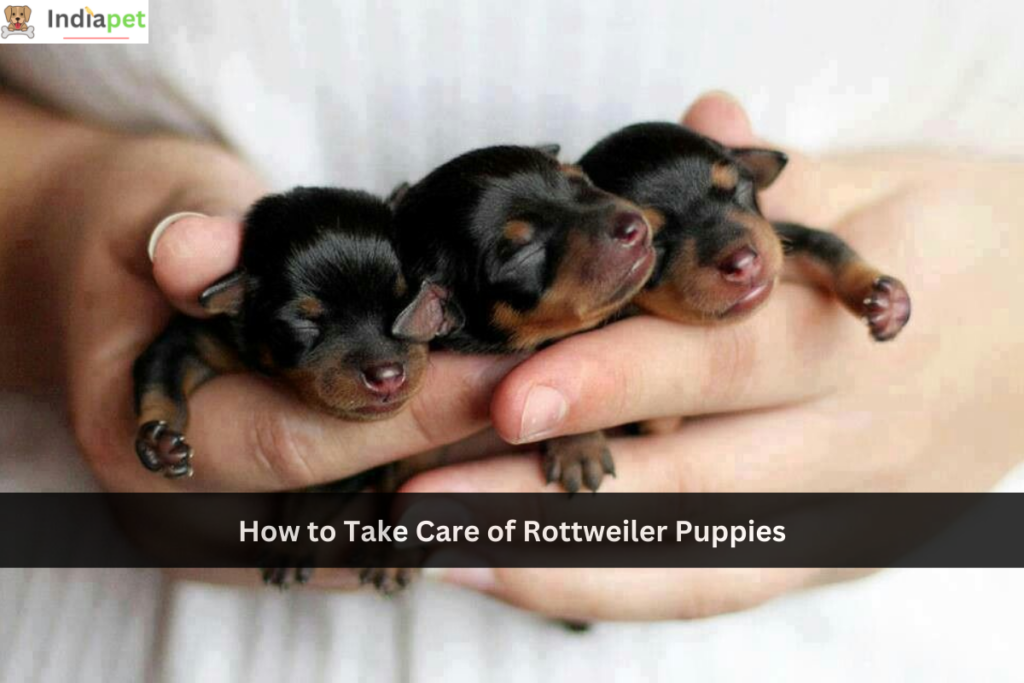How to Take Care of Rottweiler Puppies: Introducing a new addition to your family is always an exciting time, and when it comes to Rottweiler puppies, you can expect plenty of love, loyalty, and fun! But as with any new responsibility, proper care and training are essential. In this comprehensive guide, we’ll show you how to take care of Rottweiler puppies to ensure they grow into happy and healthy adults.
How to Take Care of Rottweiler Puppies
Understanding the Needs of Rottweiler Puppies
Rottweiler puppies have specific needs that must be met in order for them to thrive. One of the most important aspects of caring for a Rottweiler puppy is understanding their exercise requirements. These energetic pups need plenty of physical activity to burn off energy and prevent behavior problems. Aim for at least 30 minutes of exercise twice a day.
This can include walks, playtime in a secure yard, or interactive games like fetch.In addition to exercise, socialization is key for Rottweiler puppies. Start introducing them to new people, animals, and environments from a young age. This will help them develop into well-rounded dogs who are comfortable in various situations.
Feeding and Nutrition for Rottweiler Puppies
Proper nutrition is vital for the healthy growth and development of Rottweiler puppies. As a large breed, they have specific dietary requirements that should be met to prevent health issues. Choose a high-quality puppy food that is specifically formulated for large breeds.
Look for a balanced diet that contains essential nutrients like protein, fats, carbohydrates, vitamins, and minerals. It’s important to follow the feeding guidelines provided by the manufacturer and adjust the portions as your puppy grows. Divide your puppy’s daily food allowance into several small meals throughout the day to prevent bloating, a common issue in Rottweilers.
Avoid overfeeding or free-feeding, as this can lead to obesity. Provide fresh water at all times and monitor your puppy’s weight regularly to ensure they are growing at a healthy rate. If you have any concerns about your puppy’s diet or weight gain, consult with your veterinarian.
Exercise and Playtime for Rottweiler Puppies
Exercise is not only important for a Rottweiler puppy’s physical health but also for their mental well-being. These active dogs require regular exercise to keep them happy and prevent boredom-related behaviors. A tired Rottweiler is a well-behaved Rottweiler!
Start with short, controlled walks on a leash to get your puppy used to the outside world. Gradually increase the duration and intensity of the walks as they grow older. Remember to keep your puppy on a leash in public areas to ensure their safety. In addition to walks, provide plenty of playtime in a secure yard or indoor area. Rottweilers enjoy interactive games like fetch, tug-of-war, and puzzle toys that challenge their problem-solving skills.
Grooming and Hygiene for Rottweiler Puppies
Rottweilers have a short, dense coat that requires minimal grooming. However, regular brushing is still necessary to remove loose hair, prevent matting, and keep their coat healthy. Use a soft-bristle brush or grooming mitt to brush your puppy’s coat at least once a week. This will also help distribute natural oils and keep their skin moisturized.
In addition to brushing, check your puppy’s ears regularly for signs of infection or debris. Clean their ears gently with a damp cloth or ear cleaning solution recommended by your veterinarian. Trim your puppy’s nails every few weeks to prevent them from becoming too long or causing discomfort. If you’re unsure about nail trimming, consult with a professional groomer or veterinarian.
Also See:
How And When To Switch From Puppy To Adult Dog Food
Health Care for Rottweiler Puppies
Regular veterinary care is essential for the overall health and well-being of your Rottweiler puppy. Schedule routine check-ups with your veterinarian to monitor their growth, vaccinations, and overall health. Vaccinations are crucial for protecting your puppy against common diseases, so make sure to follow the recommended vaccination schedule.
Maintain a regular schedule for deworming and flea and tick prevention. Your veterinarian can recommend the appropriate products and schedule based on your puppy’s needs. Be observant of any changes in your puppy’s behavior, appetite, or bathroom habits, as these can be signs of underlying health issues. If you notice anything unusual, don’t hesitate to contact your veterinarian for advice.
Common Behavioral Issues in Rottweiler Puppies and How to Address Them
Rottweilers, like any other breed, may experience behavioral issues during their puppyhood. It’s important to address these issues promptly to prevent them from becoming ingrained habits. Some common behavioral issues in Rottweiler puppies include biting, chewing, jumping, and excessive barking.
Consistency and positive reinforcement training techniques are key to addressing these issues. Redirect your puppy’s biting and chewing behaviors onto appropriate toys and provide plenty of mental and physical stimulation to prevent boredom.
Teach them alternative behaviors like sitting or lying down instead of jumping. Excessive barking can be managed through training and providing outlets for their energy. If you’re struggling with any specific behavioral issues, consider seeking guidance from a professional dog trainer or behaviorist.
Frequently Asked Questions About Rottweiler Puppy Care
Q: How often should I feed my Rottweiler puppy?
A: Rottweiler puppies should be fed several small meals throughout the day to prevent bloating. Follow the feeding guidelines provided by the manufacturer and adjust the portions as your puppy grows.
Q: When should I start training my Rottweiler puppy?
A: Start training your Rottweiler puppy as soon as you bring them home. Early socialization and basic obedience training are important for their development.
Q: How often should I groom my Rottweiler puppy?
A: Rottweilers have a short coat that requires minimal grooming. Brush their coat at least once a week to remove loose hair and keep their coat healthy.
Q: Can Rottweilers be left alone for long periods of time?
A: Rottweilers are social dogs and thrive on human companionship. They can become anxious or develop behavioral issues if left alone for long periods of time. It’s important to provide them with plenty of exercise, mental stimulation, and socialization.
Q: Are Rottweilers good with children?
A: Rottweilers can be great family dogs and are generally good with children. However, proper socialization and supervision are important to ensure positive interactions.
Conclusion
Caring for a Rottweiler puppy requires time, patience, and dedication. By understanding their needs and providing them with proper care, you can ensure they grow into happy and healthy adults. Establish a routine for feeding, exercise, and socialization, and make sure to provide a safe and stimulating environment. Regular grooming, health care, and training are also essential for their overall well-being. Remember, a well-cared-for Rottweiler puppy will reward you with a lifetime of love and loyalty.


